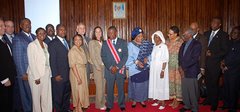
Idian Female Police Contingent in Liberia, the advance team - comprising of 14 male (logistics team) and the female Contingent Commander (Seema Dhundiya) -- arrived in Liberia yesterday.
The main, According to UNMIL Press Release, contingent is expected to arrive in Liberia next week.
The Indian Female FPU Contingent consists of 125 members (including the advance party). 103 are women (operational) and 22 are men (logistics).
The 103 women are broken down into 3 platoons of 30 women each (1 platoon leader + 29 officers). The remaining 13 members are all officers including the Deputy Commander, Duty Officers, Logistics Officers, Operational, Liaison Officers, 1 Doctor and 1 Nurse.
The contingent will operate their own Level I hospital within their camp in Monrovia, and will be based in Monrovia but could be deployed anywhere in Liberia, according to the release.
During the first week, the contingent will undergo the standard UN check-in process including Induction, general familiarisation, preparation of camp, etc.
Within one week of their arrival, the contingent will team up with their Jordanian, Nepalese and Nigerian counterparts for a training period called "Operational Transitional Period". Below is an interviw by VOA's James Butty with UNMIL's Spokesman, Ben Malor :
The first all-female U.N. peacekeeping force made up of 105 Indian policewomen is set to begin a mission this week in Liberia. Ben Malor is spokesman and acting chief for public information for the United Nations Mission in Liberia. He explained their time of arrival and their expected role in Liberia.
“The expectation right now is that sometime from this morning as we are speaking that there will be an advance party of about 15 officials coming just to prepare the ground, and then in very early February we are expecting the full contingent to arrive here in Liberia and begin all the preparatory work to be part of the police team here in the United Nations, working at the invitation of the Liberian government, but particularly together with the Liberian National Police to maintain peace and order in Liberia,” he said.
Malor said for some time now, women have been making inroads in the area of peacekeeping.
“We do have a very good number of peacekeepers who are women serving here in Liberia. Secondly, there is the desire and the need by the United Nations to have more women involved in peacekeeping. As you know, when there is conflict around the world, it is women in particular together with children who bear the brunt of the horrible aspects of war and conflict. And so it is fitting to believe that when you have women at the problem-solving end of the issues pertaining to conflict, they bring a dimension that is more than relevant in making sure that the effects of war are not so seriously felt particularly by women, by children in particular and by the population at large,” Malor said.
He rejects any suggestion that the coming of the all-female U.N. peacekeeping force is for symbolic reason.
“Why would it be symbolic when you have a president who is a woman in Madame Ellen Johnson Sirleaf? Why would it be symbolic when the inspector-general of the Liberian national police, Madame Beatrice Munnah Sieh. Why would it be symbolic when we already so many prominent women taking part in peacekeeping? May be it is long overdue and it should not be viewed as symbolic. This is very significant, and we really welcome the contribution they are going to make,” Malor said.
During the first week, the contingent will undergo the standard UN check-in process including Induction, general familiarisation, preparation of camp, etc.
Within one week of their arrival, the contingent will team up with their Jordanian, Nepalese and Nigerian counterparts for a training period called "Operational Transitional Period". Below is an interviw by VOA's James Butty with UNMIL's Spokesman, Ben Malor :
The first all-female U.N. peacekeeping force made up of 105 Indian policewomen is set to begin a mission this week in Liberia. Ben Malor is spokesman and acting chief for public information for the United Nations Mission in Liberia. He explained their time of arrival and their expected role in Liberia.
“The expectation right now is that sometime from this morning as we are speaking that there will be an advance party of about 15 officials coming just to prepare the ground, and then in very early February we are expecting the full contingent to arrive here in Liberia and begin all the preparatory work to be part of the police team here in the United Nations, working at the invitation of the Liberian government, but particularly together with the Liberian National Police to maintain peace and order in Liberia,” he said.
Malor said for some time now, women have been making inroads in the area of peacekeeping.
“We do have a very good number of peacekeepers who are women serving here in Liberia. Secondly, there is the desire and the need by the United Nations to have more women involved in peacekeeping. As you know, when there is conflict around the world, it is women in particular together with children who bear the brunt of the horrible aspects of war and conflict. And so it is fitting to believe that when you have women at the problem-solving end of the issues pertaining to conflict, they bring a dimension that is more than relevant in making sure that the effects of war are not so seriously felt particularly by women, by children in particular and by the population at large,” Malor said.
He rejects any suggestion that the coming of the all-female U.N. peacekeeping force is for symbolic reason.
“Why would it be symbolic when you have a president who is a woman in Madame Ellen Johnson Sirleaf? Why would it be symbolic when the inspector-general of the Liberian national police, Madame Beatrice Munnah Sieh. Why would it be symbolic when we already so many prominent women taking part in peacekeeping? May be it is long overdue and it should not be viewed as symbolic. This is very significant, and we really welcome the contribution they are going to make,” Malor said.









